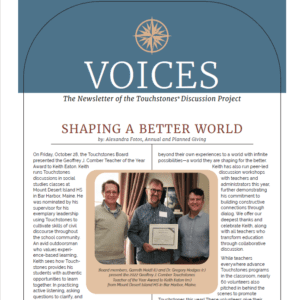By Stefanie Takacs
In our April and July newsletters, we wrote about our Saturday community discussions—one of our early responses to being physically isolated from others. Six months into that program, which runs online every other weekend, it remains a serious commitment yielding bittersweet fruit. We’re committed to addressing the difficult issues each of us faces in our own communities. And there is significant preparation needed to lead discussions on emotionally charged and challenging topics. As we say to those whom we train, a Touchstones discussion leader is both the bridge and the conscience for a group. My responsibilities are to all participants and the group overall. I can’t ask others to delve into issues of rights, bias, and prejudice if I’m not also doing that work.
Each meeting, we raise a question about how we’re thinking and why—as individuals in a complex society. Before sharing the text this past weekend, I asked, “How do we assess what we see?” Like everyone else in the discussion, I am trying to recognize the underlying structures that shape my own perceptions and thinking. It’s not easy, but it is necessary. In our discussions, we are actively working to build a community that overcomes centuries of exclusionary habits tied to power.

A Shady Nook, by Loïs Mailou Jones, was the text for our most recent community discussion. It graces the cover of the Touchstones Volume, Exploring American Perspectives.
The group has read and discussed many excerpts, including ones from Ralph Ellison’s Invisible Man and MLK’s Nobel Peace Prize acceptance speech. We’ve used those texts and our own experiences to examine who does and doesn’t have a voice and why. This week we explored a painting by Loïs Mailou Jones, who left the U.S. to work in Paris because there was no recognition or place here for Black artists.
What is it about this program that brings others together, discussion after discussion, in courageous vulnerability? The reasons are as diverse as the participants themselves:
“First of all, I enjoy the intellectual stimulation. Living (with two master’s degrees) in a very small rural island community of fishermen, and having three people ages 5, 10, and 13 years old as my colleagues, I sometimes feel I am not meeting my full potential. [These] discussions help me feel connected to a larger community of people seeking understanding. Secondly, I like the practice I am getting. Soon I will be leading a group of students in Touchstones discussions. Engaging in discourse does not come naturally to me. Our Saturday group makes me feel like I am being heard and what I say matters, which makes me feel valued. As a first-generation Hispanic woman, I have been marginalized in many ways. I hide behind my taken surname, keeping it even after a divorce, to mask my origins…. This last meeting, I felt like I had more ownership. Thank you for inviting me in.” — Laura
“The opportunity to reach outside my own thoughts and let the thoughts and ideas of others resonate, echo, amplify, or challenge my own provides perspective and community that reaffirms my belief in discourse as central to our educations, no matter how old we are.” — Gary
“Touchstones community discussions by Zoom achieve what radio, television, and internet apps have long dreamed of—building true communities and expanding human horizons. They tune the soul, transforming dissonance through simple ground rules into beautiful music, grounding and inspiring one to see the world and its possibilities anew. No small feat.” — Tom



 Join the
Join the